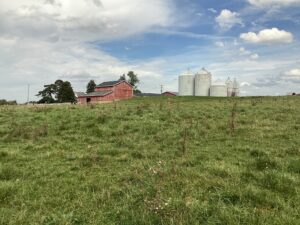Bridgewater Township & Clinton Township, Michigan – August 15, 2024 – A 200-acre working family farm straddling Washtenaw and Lenawee counites and boasting scenic views along the US-12 Heritage Trail is now permanently protected by Legacy Land Conservancy.
Thanks to the commitment of landowner Ron Jansen, Jansen Farms is conserved through a conservation easement, which offers permanent protection of privately-owned land. A conservation easement conserves the land forever while allowing it to remain in private ownership.
Preservation of Jansen Farms, which consists of prime agricultural land and high-quality natural areas, is significant as Michigan continues to lose land, especially farmland, at an alarming rate.
“According to The American Farmland Trust, if we don’t act quickly to counter current trends, over 483,800 acres of prime farmland will be paved over, fragmented, or converted to uses incompatible with food production by 2040 in Michigan,” Legacy Land Conservancy Executive Director Diana Kern said.
Approximately 90% of soils on Jansen Farms have been identified as ‘prime farmland’ and/or ‘farmland of local importance’ by the U.S. Department of Agriculture and Natural Resources Conservation Service. The property has a long history of productive farming in a farm-dependent community, and it remains an important part within our food system. Ron currently lives on the farm and raises sheep. A portion of the farmland is leased out to local farmers.

Preserving farmland, protects more than open space, scenic views, and productive agricultural soils. It also protects a patchwork of natural areas that contain critical infrastructure supporting wildlife corridors, carbon storage and sequestration, climate resiliency, and pollinator habitat. Trout lily, trillium, and may apples blanket the forest floor, and game birds like pheasants and turkey roam the property’s fields.
Jansen, a conservation-minded farmer, has demonstrated a long commitment to land protection and invested considerable effort over the years into stewarding the woodlands, wetlands, and emergent marsh areas of his property. Most recently, in 2020 he partnered with the U.S. Fish and Wildlife Service (USFWS) through their Partners for Fish and Wildlife (PFW) Program to create three wildlife habitat ponds on the property. This work added or improved approximately three acres of emergent wetland. These ponds provide important resting place for migrating birds.
“Often times people don’t realize farms also contain natural areas that benefit from protection,” U.S. Fish and Wildlife Service Biologist Jim Hazelman said. “Ron Jansen understands his property provides for cattle and sheep, and it also provides habitat benefits for waterfowl, migratory birds, butterflies and native bee’s along with deer, turkey and other local wildlife. It’s wonderful to see all of his land–restored wetlands and native habitats included–permanently protected.”
Jansen Farms sits uniquely within Washtenaw and Lenawee counties and is Legacy’s first conservation easement in Lenawee County since officially expanding its service area there in 2021. Jansen joins a small list of protected lands in Bridgewater and Clinton townships, and becomes an anchor for future land protection projects among a community dealing with significant development pressure.
“I’ve always wanted to keep my farmland for farming. No matter how many times I was approached by various developers and companies to sell or lease my land,” Jansen said, “working with Legacy on a solution that balanced my financial needs and ensured the land would remain natural and agricultural was the right choice.”
The cost to purchase the development rights from Jansen Farms was more than $700,000. Jansen donated a portion of the conservation easement value, and funding to purchase the remaining amount came from local, federal, and private entities––the Natural Resource Conservation Service (NRCS), Washtenaw County Parks & Recreation Commission (WCPARC), the Carls Foundation, and an anonymous funder. Because the property spans two counties, funding from WCPARC was only used for the portion located in Washtenaw County.
Jansen will use the funds to invest in farm infrastructure and operations, and the conservation easement will be a central component of his succession planning. Family farms are increasingly disappearing as farmers age out of their work with no successors in place and sell their land to developers. Without a successor to take over his farm, the easement secures a legacy for future generations who can continue to grow food on the land and ensure that the farmland is kept working long after Jansen.
“Farming is my life. My farm means the world to me and I’m happy that the land will be here for others to continue what I started,” Jansen said.
History of the Jansen Farm
Jansen, along with his father and brother, purchased the property in 1974 as Jansen Farms. Prior to their ownership, the property had purportedly been used to grow wheat and raise and graze sheep. Under Jansen Farms, the property grew corn, soy, wheat, oats, and hay, and supported an average of 60 ewes at any given time. Currently, Jansen lives on the property and actively sheep farms on a portion. The remaining farmland is leased to local commodity crop farmers.
About Legacy Land Conservancy: Founded in 1971 as Michigan’s first local land trust, Legacy is a nonprofit conservation organization that protects land in southern Michigan. Legacy’s mission is to safeguard Michigan’s land and water to support diverse, resilient, and thriving communities–forever. Legacy has helped to protect more than 10,000 acres of land, including eight nature preserves open for all to enjoy. In a testament to over 50 years of successful voluntary conservation, Legacy is accredited by the Land Trust Accreditation Commission for adhering to a set of standards designed to ensure the organization’s work will endure forever. Legacy is based in Ann Arbor, Michigan. For more information, visit www.legacylandconservancy.org.
About U.S. Department of Agriculture Natural Resources Conservation Service (NRCS): For more than 80 years, NRCS and its predecessor agencies have worked in close partnerships with farmers and ranchers, local and state governments, and other federal agencies to maintain healthy and productive working landscapes by delivering conservation solutions. Through financial and technical assistance programs, NRCS helps America’s farmers, ranchers and forest landowners conserve the nation’s soil, water, air and other natural resources benefiting both the landowner and the environment. For more information, visit https://www.nrcs.usda.gov/programs-initiatives/ale-agricultural-land-easements
About Washtenaw County Parks and Recreation Commission (WCPARC): WCPARC’s mission is to enhance the quality of life in the County by promoting a healthy lifestyle, efficiently providing high quality facilities and programs reflective of current and anticipated recreational needs of County residents and visitors—with particular emphasis on preserving fragile lands, water quality, wildlife habitat, creating pedestrian and greenway connections, and providing high quality services to those of all backgrounds. WCPARC manages Washtenaw County’s Natural Area Preservation Program (NAPP) which was established in 2000 by the Washtenaw County Board of Commissioners through an ordinance that provides procedures and standards for purchase and protection of natural areas and agricultural land by the County. In 2010, and again in 2020, voters chose to renew the county-wide millage that funds the program. For more information, visit https://www.washtenaw.org/939/Natural-Areas-Preservation-Program













